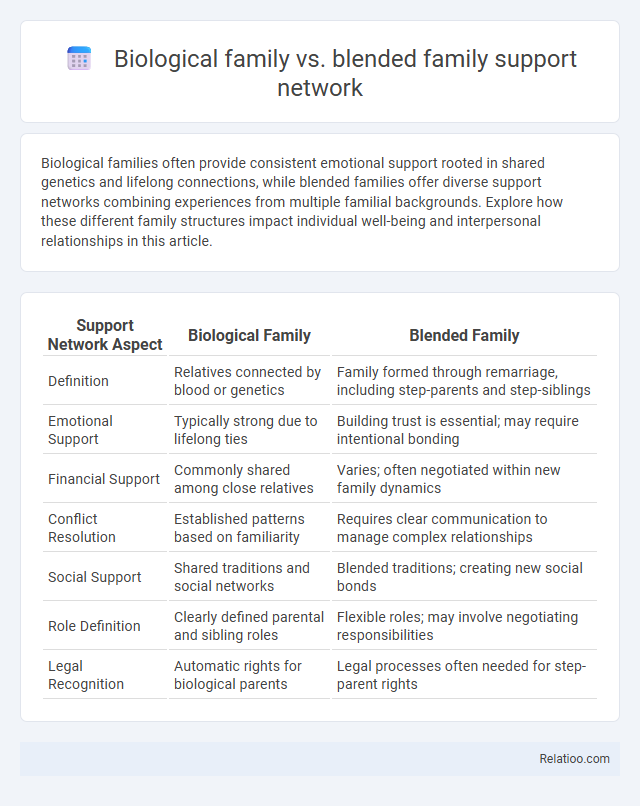Biological families often provide consistent emotional support rooted in shared genetics and lifelong connections, while blended families offer diverse support networks combining experiences from multiple familial backgrounds. Explore how these different family structures impact individual well-being and interpersonal relationships in this article.
Table of Comparison
| Support Network Aspect | Biological Family | Blended Family |
|---|---|---|
| Definition | Relatives connected by blood or genetics | Family formed through remarriage, including step-parents and step-siblings |
| Emotional Support | Typically strong due to lifelong ties | Building trust is essential; may require intentional bonding |
| Financial Support | Commonly shared among close relatives | Varies; often negotiated within new family dynamics |
| Conflict Resolution | Established patterns based on familiarity | Requires clear communication to manage complex relationships |
| Social Support | Shared traditions and social networks | Blended traditions; creating new social bonds |
| Role Definition | Clearly defined parental and sibling roles | Flexible roles; may involve negotiating responsibilities |
| Legal Recognition | Automatic rights for biological parents | Legal processes often needed for step-parent rights |
Understanding Biological and Blended Families
Understanding biological and blended families highlights differences in support networks essential for your emotional well-being. Biological families offer support through shared genetics and history, fostering inherent bonds grounded in upbringing and tradition. Blended family support networks require intentional relationship-building and communication, combining members from previous unions to form a cohesive unit that supports individual and collective growth.
Key Differences in Family Structures
Biological family support networks consist of relatives related by blood or genetics, providing consistent emotional and social ties based on shared heritage. Blended family support networks include members from previous relationships, step-relatives, and half-siblings, requiring adaptation to diverse roles and dynamics within the household. Your support network may extend beyond family to include friends and community resources, emphasizing chosen relationships over biological connections in varying family structures.
Emotional Bonds in Biological Families
Emotional bonds in biological families often provide a deep-rooted sense of belonging and unconditional support, essential for your emotional stability and personal growth. These innate connections foster trust, empathy, and lifelong loyalty that are sometimes less intense in blended family support networks, where relationships require ongoing negotiation and reinforcement. Support networks, while valuable, may lack the inherited emotional depth found in biological family ties, highlighting the unique role biological families play in nurturing emotional well-being.
Building Connections in Blended Families
Building connections in blended families involves navigating unique challenges distinct from those in traditional biological family support networks. Effective support in blended families requires fostering open communication, mutual respect, and shared experiences among step-parents, step-siblings, and biological family members to create a cohesive support network. Prioritizing active engagement and emotional bonding strengthens the blended family unit's resilience and overall social support system.
Support Networks: Who's There for You?
Biological family support networks consist of relatives connected by genetics, offering long-standing emotional and practical assistance rooted in shared heritage. Blended family support networks include members from remarriages or partnerships, combining resources and relationships to create diverse, adaptive support systems. Support networks encompass both biological and blended families, as well as friends, colleagues, and community members, providing a broad spectrum of social, emotional, and financial aid tailored to individual needs.
Challenges in Biological Family Support
Biological family support networks often face challenges such as unresolved conflicts, rigid roles, and expectations rooted in shared history, which can limit emotional growth and communication. These difficulties may strain relationships, complicate problem-solving, and affect the overall resilience of the family unit. Understanding these obstacles helps you navigate complexities when relying on biological family support compared to blended or broader support networks.
Overcoming Hurdles in Blended Family Support
Blended family support networks often face unique challenges such as navigating complex relationships and integrating differing family cultures, which biological family support may not encounter as intensely. Effective overcoming of hurdles in blended family support involves clear communication, flexible role definitions, and intentional trust-building strategies that foster cohesion among step-siblings and step-parents. Support networks tailored to blended families emphasize emotional adaptability and conflict resolution skills to enhance resilience and collective well-being within diverse family units.
Communication Patterns in Both Families
Biological family support networks often rely on long-established communication patterns grounded in shared history and consistent interaction, fostering deep emotional understanding and trust. Blended family support networks face unique challenges in communication as they integrate diverse backgrounds, requiring deliberate efforts to establish open dialogue and navigate complex relational dynamics. Your ability to adapt communication strategies significantly influences the effectiveness of support networks in both family structures.
The Role of Extended Family and Step-relatives
Extended family members in biological families often provide consistent emotional support, advice, and resources, reinforcing core family values and traditions. In blended families, step-relatives play a crucial role in expanding the support network, fostering new bonds, and navigating complex family dynamics to create a cohesive unit. Both family types benefit from these diverse support systems, which promote resilience, shared responsibility, and social connectedness across generations.
Nurturing a Healthy Support System
Biological families provide foundational emotional support through shared genetics and long-term history, fostering trust and resilience. Blended family support networks combine diverse relationships and experiences, enhancing adaptability and broader resource access. A well-rounded support network integrates biological, blended, and social connections to nurture mental health and promote sustained well-being.

Infographic: Biological family vs Blended family support network
 relatioo.com
relatioo.com